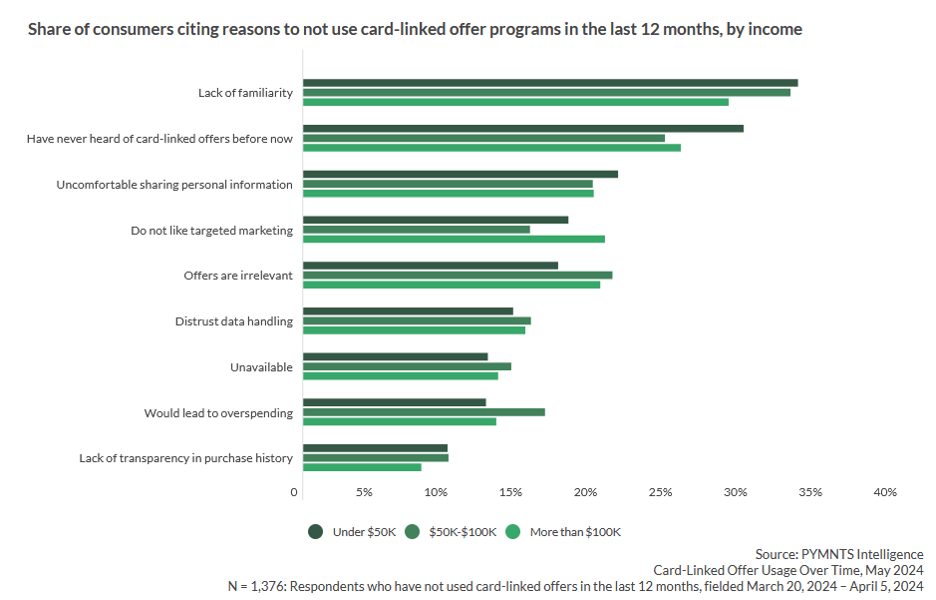35% of Lower Income-Earning Consumers Unaware of Card-Linked Offers

Card-linked offers — the coupon-like incentive programs that reward credit and debit card holders for using their cards — are highly popular with consumers who take advantage of the programs. According to PYMNTS Intelligence research, 79% of current card-linked offer users plan to continue using them in the future.
And, as we report in “Card-Linked Offer Usage Over Time,” a collaboration with Banyan, about 6 in 10 card-linked offer users say they are more satisfied with the relevancy of offers they are currently getting than what they were receiving last year.
This last finding signals real progress on the part of card providers. “How Personalized Card-Linked Offers Drive Store Card Usage,” released last October, found more than half of consumers said the card-linked offers they received at the time were irrelevant to their needs. In the newer report, 62% of card-linked offer users say they are more satisfied with the relevance of the card-linked offers they get than they were last year.

The newer report, based on surveys with more than 2,100 U.S. consumers, finds that 8 in 10 consumers who have used the offers in the recent past plan to do so again in the next 12 months.
However, in exclusive PYMNTS Intelligence data that was not included in the new report, we found that a lack of familiarity with the reward programs is why many consumers who have not used any card-linked offers in the last year opted not to do so, although reasons vary.
Among respondents who have been holding out from using card-linked offers for at least the last year, nearly 35% of low-income consumers (those earning less than $50,000 per year) and 34% of middle-income earners (those earning between $50,000 and $100,000 annually) say unfamiliarity with card-linked offers was a reason why they are staying away from the offers. Twenty-nine percent of high-income earners (those earning more than $100,000 annually) say the same. Similarly, as the accompanying figure illustrates, 32% of low-income holdouts say they have never heard of the card-linked offers prior to being asked about them in our survey, which was also true for 27% of high-income earners.
Middle-income earners who didn’t use card-linked offers were slightly more familiar with the programs, but even so, 25% of this group say they didn’t use card-linked offers because they were irrelevant to their needs, while approximately 20% of this same group say they declined to take advantage of them out of concern that doing so might lead to overspending.
While the card industry continues to make headway in addressing the issue of relevance, it remains a barrier, but lack of awareness and concerns about overspending reflect an entirely different challenge for card issuers. The former — relevancy — can be addressed by card providers examining shopping and demographic data to fine-tune the offers they send users. But a lack of awareness and overspending concerns should be addressed earlier in the customer relationship.
Greater efforts on the part of card providers to educate consumers about the programs, how they work and how consumers can benefit from them might go a long way toward winning over a larger segment of consumers.